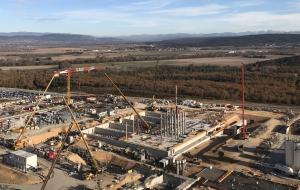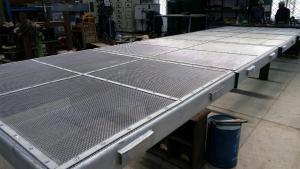Heat rejection system
Equipment keeps arriving
4 Dec 2017
Work is underway in India to fabricate the components of ITER's heat rejection system, including cooling towers, vertical pumps, electrical equipment, piping, valves, filters, and instrumentation. In addition to batches of piping that have been shipped regularly since 2015, the first equipment is starting to arrive.
On the northern edge of the platform, the cooling tower zone is under construction. Here, the heat load generated by the operation of the ITER Tokamak will be dissipated.
As an experimental device, ITER will not be converting the heat generated during operation into electricity. Instead, cooling water will circulate under pressure through the ITER installation to remove the heat load from the ITER vacuum vessel, its plasma-facing components, and plant systems such as heating and power systems and transfer it—through a cascade of cooling loops—to the heat rejection zone located on the northern edge of the platform. There, it will be cooled using an evaporative process.
The cooling tower cold basin is divided into five compartments; each compartment has two side-by-side paths for the water to flow out to the pumps. In each, log stop gates and screens (pictured) will be installed.
The infrastructure of the heat rejection system—including hot and cold cooling water basins, powerful pumps, heat exchangers, and an induced-draft cooling tower with ten individual cells—is concentrated in a 6,000-square-metre area that is under construction now on the ITER worksite. The design and fabrication of the heat rejection system is part of India's procurement contributions to the ITER Project, while the equipment will be installed by the ITER Organization. Europe has excavated the site and created the concrete basins and structures.
Following the delivery of the ozonators earlier this year, a new batch of equipment has arrived on site—including large stop log gates that can be used to close off each of the cooling basin compartments for maintenance, screens to be installed to keep debris from reaching the pumps, and auxiliary components related to installation. The Cooling Water System Section is expecting the first batch of heat exchangers before the end of the year and the first shipments of cooling tower parts in early 2018.
On site, the hot and cold basins have been created below platform level and the cold basin area has been turned over to the ITER Organization for installation activities. One of the first activities will be to install metal footings in the cold basin to prepare for the installation of the cooling tower structural members.
Read more about ITER's heat rejection system here.



